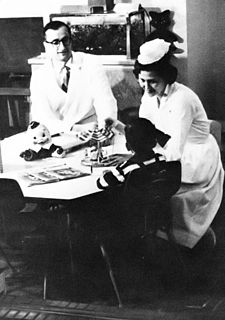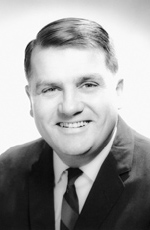Related Research Articles

John Franklin Enders was an American biomedical scientist and Nobel Laureate. Enders has been called "The Father of Modern Vaccines."
Lasker-DeBakey Clinical Medical Research Award is one of four annual awards presented by the Lasker Foundation. The Lasker-DeBakey award is given to honor outstanding work for the understanding, diagnosis, prevention, treatment, and cure of disease. This award was renamed in 2008 in honor of Michael E. DeBakey. It was previously known as the Albert Lasker Award for Clinical Medical Research.

Oral rehydration therapy (ORT) is a type of fluid replacement used to prevent and treat dehydration, especially due to diarrhea. It involves drinking water with modest amounts of sugar and salts, specifically sodium and potassium. Oral rehydration therapy can also be given by a nasogastric tube. Therapy should routinely include the use of zinc supplements. Use of oral rehydration therapy has been estimated to decrease the risk of death from diarrhea by up to 93%.

Stanley Alan Plotkin is an American physician who works as a consultant to vaccine manufacturers, such as Sanofi Pasteur, as well as biotechnology firms, non-profits and governments. In the 1960s, he played a pivotal role in discovery of a vaccine against rubella virus while working at Wistar Institute in Philadelphia. Plotkin was a member of Wistar’s active research faculty from 1960 to 1991. Today, in addition to his emeritus appointment at Wistar, he is emeritus professor of Pediatrics at the University of Pennsylvania. His book, Vaccines, is the standard reference on the subject. He is an editor with Clinical and Vaccine Immunology, which is published by the American Society for Microbiology in Washington, D.C.

The Johns Hopkins University School of Medicine (JHUSOM) is the medical school of Johns Hopkins University, a private research university in Baltimore, Maryland. Founded in 1893, the School of Medicine shares a campus with the Johns Hopkins Hospital and Johns Hopkins Children's Center, established in 1889. It has consistently ranked among the top medical schools in the United States in terms of the number/amount of research grants/funding awarded by the National Institutes of Health, among other measures.
Albany Medical College (AMC) is a private medical school in Albany, New York. It was founded in 1839 by Alden March and James H. Armsby and is one of the oldest medical schools in the nation. The college is part of the Albany Medical Center, which includes the Albany Medical Center Hospital. Along with Albany College of Pharmacy, Albany Law School, the Dudley Observatory, the Graduate College of Union University, and Union College, it is one of the constituent entities of Union University.
The Charles F. Kettering Prize was a US$250,000 award given by the General Motors Cancer Research Foundation for the most outstanding recent contribution to the diagnosis or treatment of cancer.

ICDDR,B is an international health research organisation located in Dhaka, Bangladesh. Dedicated to saving lives through research and treatment, ICDDR,B addresses some of the most critical health concerns facing the world today, ranging from improving neonatal survival to HIV/AIDS. In collaboration with academic and research institutions over the world, ICDDR,B conducts research, training and extension activities, as well as programme-based activities, to develop and share knowledge for global lifesaving solutions.
Neal A. Halsey is an American pediatrician, with sub-specialty training in infectious diseases, international health and epidemiology. Halsey is a professor emeritus of international health and director emeritus of the Institute for Vaccine Safety at the Johns Hopkins Bloomberg School of Public Health, in Baltimore, Maryland. He had a joint appointment in the Department of Pediatrics at the Johns Hopkins School of Medicine and serves as co-director of the Center for Disease Studies and Control in Guatemala.

Emil "Tom" Frei III was an American physician and oncologist. He was the former director and former physician-in-chief of the Dana-Farber Cancer Institute in Boston, Massachusetts. He was also the Richard and Susan Smith Distinguished Professor of Medicine at Harvard Medical School.
Dilip Mahalanabis was an Indian paediatrician known for pioneering the use of oral rehydration therapy to treat diarrhoeal diseases. Mahalanabis had begun researching oral rehydration therapy in 1966 as a research investigator for the Johns Hopkins University International Center for Medical Research and Training in Calcutta, India. During the Bangladeshi war for independence, he led the effort by the Johns Hopkins Center that demonstrated the dramatic life-saving effectiveness of oral rehydration therapy when cholera broke out in 1971 among refugees from East Bengal who had sought asylum in West Bengal. The simple, inexpensive Oral Rehydration Solution (ORS) gained acceptance, and was later hailed as one of the most important medical advances of the 20th century.

Hattie Elizabeth Alexander was an American pediatrician and microbiologist. She earned her M.D. from Johns Hopkins University in 1930 and continued her research and medical career at Columbia-Presbyterian Hospital in New York City. Alexander became the lead microbiologist and the head of the bacterial infections program at Columbia-Presbyterian. She occupied many prestigious positions at Columbia University and was well honored even after her death from liver cancer in 1968. Alexander is known for her development of the first effective remedies for Haemophilus influenzae infection, as well as being one of the first scientists to identify and study antibiotic resistance. She has received many awards and honors including the E. Mead Johnson Award in 1942, for her headway in pediatric research and antibiotic resistance. Alexander's research and studies helped lay the ground work for research into antibiotic and vaccine development.
Emil J. Freireich was an American hematologist, oncologist, and cancer biologist. He was recognized as a pioneer in the treatment of cancer and use of chemotherapy and is often known as the father of modern leukemia therapy.
Since 1994, the Albert B. Sabin Gold Medal has been awarded annually by the Sabin Vaccine Institute in recognition of work in the field of vaccinology or a complementary field. It is in commemoration of the pioneering work of Albert B. Sabin.

Donald Paul Pinkel was an American physician who specialized in pediatric hematology and oncology. Pinkel made contributions to cures for several forms of childhood cancer, including leukemia.
David R. Nalin is an American physiologist, and Pollin Prize for Pediatric Research and Prince Mahidol Award, a.k.a. Mahidol Medal winner. Nalin had the key insight that oral rehydration therapy (ORT) would work if the volume of solution patients drank matched the volume of their fluid losses, and that this would drastically reduce or completely replace the only current treatment for cholera, intravenous therapy. Nalin led the trials that first demonstrated ORT works, both in cholera patients, and more significantly, also in other dehydrating diarrhea illnesses. Nalin's discoveries have been estimated to have saved over 50 million lives worldwide.
Samuel Lawrence Katz was an American pediatrician and virologist whose career has been devoted to infectious disease research, focusing principally on vaccine research and development. Katz was the Wilburt Cornell Davison Professor and Chairman of Pediatrics at Duke University.

Richard Alan Cash, M.D., M.P.H. is an American global health researcher, public health physician, and internist. He is a Senior Lecturer in International Health at the Harvard T.H. Chan School of Public Health in Boston. Cash began his international career over 40 years ago when he was assigned by NIAID of the NIH to the Pakistan-SEATO Cholera Research Laboratory (CRL) in Dhaka, East Pakistan. While there, he and his colleagues developed and conducted the first clinical trials of oral rehydration therapy (ORT) in adult and pediatric cholera patients and patients with other infectious causes of diarrhea. This technology matches the volume of fluid losses from dehydration patients with the volume they consume so that the fluid replacement packets greatly reduce or completely replace IV therapy, which was then the only current treatment for cholera. Discoveries in ORT have been estimated to have saved over 50 million lives worldwide. World Health Organization (WHO) estimates are that at least 60 million children have been spared painful deaths because of ORT. They also conducted the first field trials of ORT, the first community-based trials of ORT, and the first use of amino acids (glycine) as an additional substrate. In the late 1970s, Cash worked with BRAC on their OTEP, which taught over 13 million mothers and caregivers how to prepare and use ORT in the home using the "pinch and scoop" method.

Cancer: The Emperor of All Maladies is a 2015 American documentary film produced and directed by Barak Goodman and executive produced by Ken Burns. The film, in three episodes of two hours each, is based on the Pulitzer Prize-winning 2010 book The Emperor of All Maladies: A Biography of Cancer, by Siddhartha Mukherjee, and describes the history of cancer and cancer treatments, particularly in the United States.

Sallie Robey Permar is the pediatrician-in-chief at NewYork-Presbyterian / Weill Cornell Medical Center and the chair of the Department of Pediatrics at Weill Cornell Medicine. Her research focuses on infections affecting newborns.
References
- 1 2 "Four Physicians Honored for Their Historic Contributions to the Treatment of Pediatric Leukemia - New York Presbyterian Hospital". 2003-12-19. Retrieved 2009-03-14.
The 2003 Pollin Prize, the sole international award for advances in children's health care, is awarded to Drs. Emil Frei, Emil J. Freireich, Donald Pinkel, and James F. Holland. An awards ceremony takes place today at NewYork-Presbyterian Hospital
- 1 2 "Pollin Prize Awarded To Dr. Samuel L. Katz For His Role In Developing Measles Vaccine". Medical News Today. 2007-04-13. Retrieved 2009-03-14.
Dr. Samuel L. Katz is the recipient of the 2007 Pollin Prize in recognition of his contributions to pediatric infectious disease research and vaccine development, especially his instrumental role in the development and application of the measles vaccine
- ↑ "Pollin Pediatric Research Prize Awarded for Discovering Molecular and Biochemical Basis of Genetic Diseases". NewYork-Presbyterian Hospital. 21 April 2010. Archived from the original on 20 July 2010. Retrieved 4 December 2018.
{{cite web}}: CS1 maint: unfit URL (link) - ↑ "Awards and recognition". Montreal Children's Hospital. Retrieved 15 December 2014.
- 1 2 3 "Pollin Prize". NewYork-Presbyterian Hospital. Archived from the original on 2009-06-18. Retrieved 2009-06-08.
- ↑ Astigarraga, Carolina (2007-04-20). "Prof honored for measles vaccine" . Retrieved 2018-12-04.
For this and many other accomplishments, Katz was recently awarded the 2007 Pollin Prize in a weekend-long celebration at New York-Presbyterian Hospital.
- ↑ Miller, Robert (2005-12-14). "Robert Miller column". The Dallas Morning News. Retrieved 2009-03-14.
Dr. Eric Olson, chairman of molecular biology at the University of Texas Southwestern Medical Center, has won the fourth annual Pollin Prize in Pediatric Research, a lifetime achievement award for contributions to biomedical or public health research.
- ↑ "Hopkins doctor tapped for prestigious Pollin Prize". Baltimore Business Journal. 2004-12-14. Retrieved 2009-03-14.
Dr. Alfred Sommer, dean of the Johns Hopkins Bloomberg School of Public Health, will receive a $100,000 research award, Hopkins said Tuesday. The Pollin Prize, which recognizes...
- ↑ "NewYork-Presbyterian Hospital Announces First Pollin Prize in Pediatric Research Recognizing Developers of Revolutionary Oral Rehydration Therapy; 'Most Important Medical Discovery of 20th Century'" (Press release). 2002-11-13. Retrieved 2009-03-14.
- ↑ "Dr Dillip Mahalanabis gets Pollin Prize for ORT". Archived from the original on 2003-01-09. Retrieved 2009-03-14.
Indian public health expert Dr Dillip Mahalanabis shares the first Pollin Prize for Pediatric Research with three American counterparts for the discovery of Oral Rehydration Therapy (ORT), dubbed the most important medical discovery of the 20th century